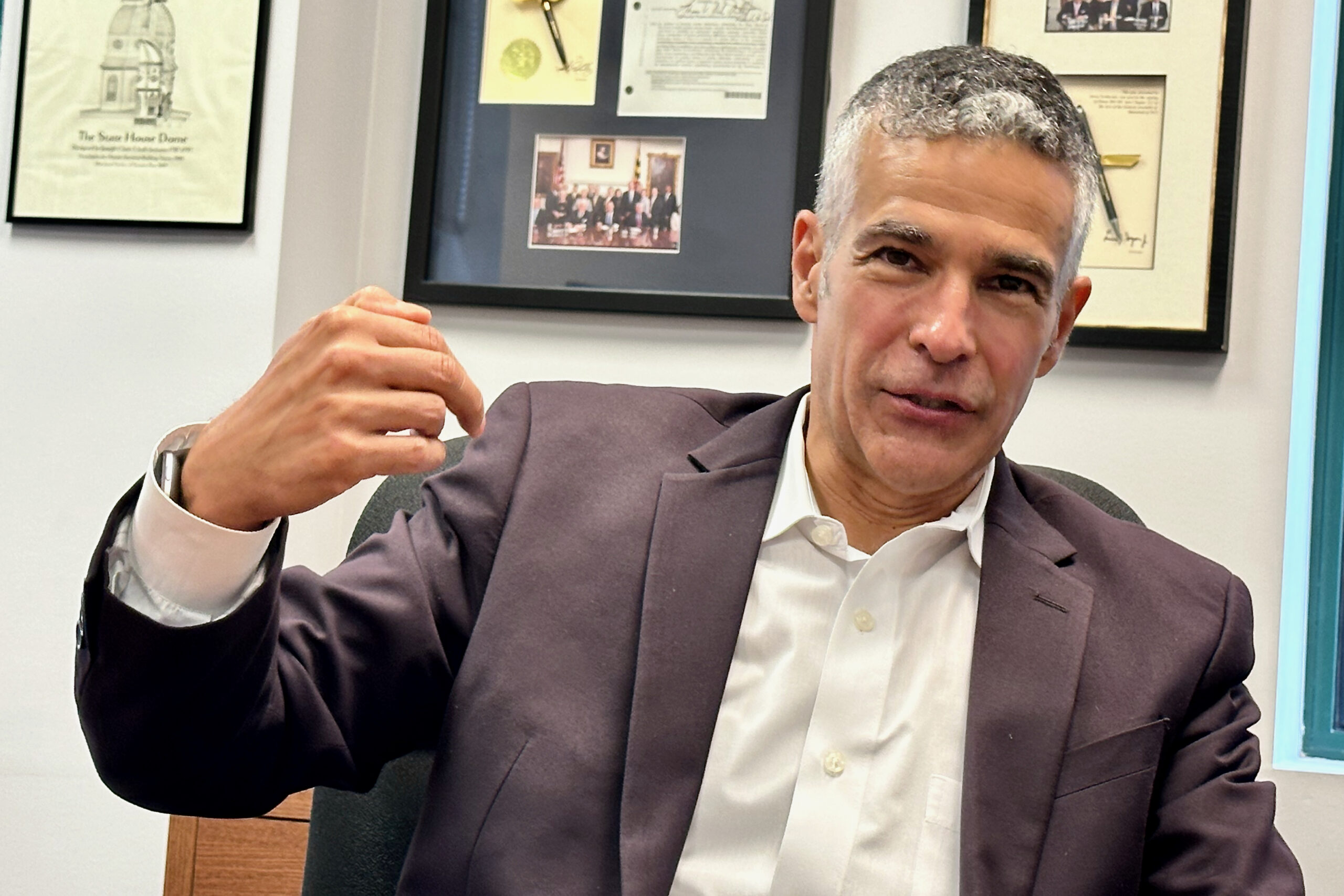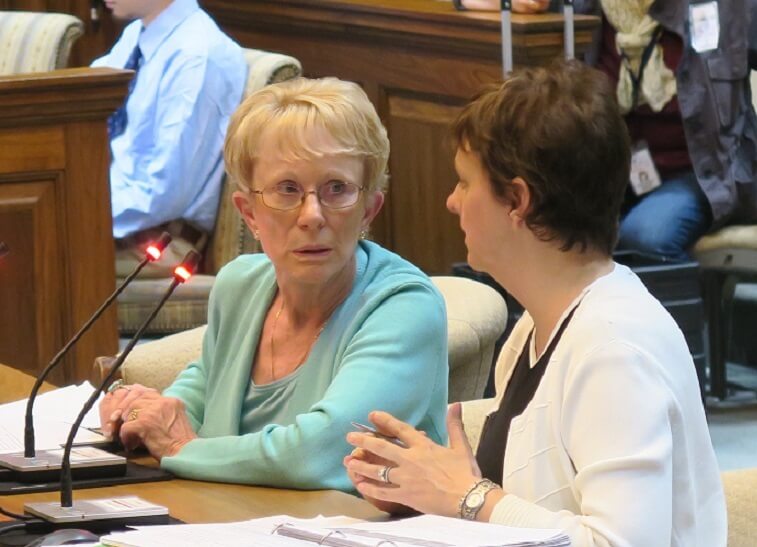Official: If New Ballots Are Needed Due to Kamenetz’s Death, Cost Could Be $2 Million

News of Baltimore County Executive Kevin B. Kamenetz’s sudden death last week stunned nearly everyone who heard it, but on a less personal level, it sent the Maryland Democratic machinery reeling, as the hierarchy assessed such an election-altering event little more than six weeks before the primary.
The ultimate outcome, in many ways, lies directly with Kamenetz’s running mate, Valerie L. Ervin, surviving candidate for lieutenant governor, the ticket’s No. 2 position, which cannot stand alone and which many voters consider as an afterthought, if they consider it at all.
State election law places an enormous amount of power in Ervin’s hands, allowing her to decide whether to stay in the race, and if so, whether as a candidate for governor or lieutenant governor. If she decides to stay in the race in either capacity, she and her selection of a new running mate – “the successor candidate” — would have to file a certificate of candidacy with the state election board no later than Thursday, 40 days before the primary.
Further complicating the matter is that the State Board of Elections last week mailed all the military and overseas absentee ballots — with the Kamenetz-Ervin pairing on them — in accordance with federal law requiring that they go out by Saturday, 45 days before the election.

And finally, if you thought the question of whether the name of disgraced legislator Nathaniel T. Oaks should be taken off Baltimore’s 41st District primary ballot was resolved once and for all on May 2 by the Maryland Court of Appeals, think again.
Late Friday, attorneys for three voters seeking removal of Oaks’s name filed a motion with the Court of Appeals, asking the high court to reconsider its denial of ordering his name off the 41st District ballot, if all the state’s ballots have to be reprinted because of Kamenetz’s death.
Kamenetz, who died at age 60 early Thursday, was interred Friday. The Kamenetz-Ervin campaign temporarily suspended any public discussion of future plans, though it remains acutely aware of the upcoming Thursday deadline.
Ervin, 61, a former Montgomery County Council and school board member, is faced with three options: Withdraw from the race; run as candidate for governor in Kamenetz’s place and select a new lieutenant governor candidate; or select a new candidate for governor to replace Kamenetz and remain as the lieutenant governor candidate on the new ticket.
One consideration in Ervin’s decision to run or not could be that the Kamenetz campaign reportedly already has booked roughly $1 million in television advertising time in advance of the primary.
Linda H. Lamone, Maryland elections administrator, said late Friday she had no plans to have the primary ballots reprinted at this point because she maintains a section of state election law gives her discretion in determining whether there is sufficient time to revise the ballots with the correct names.
And in Lamone’s assessment, there is not enough time to make any change, given the complexity of such an undertaking, the potential for error — and the fact that the overseas and military ballots already have been mailed out.
“I’m not going to do anything unless ordered by a court to do it,” she said.
In a situation where the ballot is not revised and reprinted, the law requires that the election board notify voters of the change in candidacy, the procedure to be used to record the voter’s vote and the procedure to be used by the board in canvassing the vote.
If Ervin were to withdraw from the race outright, then Lamone said she believed there would be no reason to reprint the ballot because at that point, the candidate would be considered “disqualified,” a distinction addressed by the Court of Appeals in the Oaks case, in which the high court ruled that the name stays on the ballot.
But if Ervin decides to proceed as a candidate with a new running mate, that could be another story.
“She needs to file the paperwork, and we’ll make the determination at that point,” Lamone said.
Reprinting the 3.5 million ballots statewide would cost an estimated $2 million, on top of the $1 million printing costs the state has already incurred, she said.
Election officials have described the tedious and complicated process of proofing, testing and printing 747 configurations of the primary ballot — each with different candidate listings for the varying combinations of congressional, legislative and local districts, depending on polling place locations statewide.
The question of which section of Maryland election law controls whether the ballot is reprinted or not appears ambiguous on the surface and may ultimately have to be decided by the courts.
Giving the state administrator discretion to determine whether or not to reprint seems to be at odds with another section of the election law that deals specifically with the death of a candidate for governor before the primary election.
Under that section of law, the language seems explicit in describing what happens if Ervin, as the surviving lieutenant governor candidate, decides to press ahead as a candidate with a designated new running mate.
“The names of any governor and lieutenant governor unit that is designated … shall be listed jointly on the primary election ballot,” the law reads.
It goes on to say that if the death of a gubernatorial candidate occurs fewer than 10 days before the primary, the names of the “existing governor and lieutenant governor unit whose filing is complete shall remain on the ballot,” referring to the names of the gubernatorial candidate who died and that of his or her running mate.
While the 10-day rule does not apply in the Kamenetz-Ervin case, the language of the law seems to suggest that if the death or disqualification occurred before that 10-day period – in this case before June 16 — the names of the deceased gubernatorial candidate and running mate would be removed from the ballot or changed.
At present, the Kamenetz-Ervin team appears fifth out of nine pairings in the listing for governor and lieutenant governor candidates on the Democratic ballot. The teams are listed alphabetically by the gubernatorial candidate’s last name.
If Ervin were to continue running, the ballot order could change, should it be reprinted. If she moved to the top of the ticket, it would change outright because her surname begins with “E”; if she picked another candidate for governor and continued as a candidate for lieutenant governor, placement would be determined by her running mate’s last name.
Historically, the common wisdom has been that names appearing higher on the ballot – determined alphabetically — are more apt to draw a higher number of votes from undiscriminating voters.
In the Oaks case, which remarkably has been resurrected from appellate files of decisions past, attorneys for three registered voters from the 41st District saw a possible opening as a result of the Kamenetz death and asked the Court of Appeals to reconsider an earlier decision.
The lawyers, H. Mark Stichel and Elizabeth A. Harlan, filed a motion asking the court to reverse itself and allow for Oaks’ name to be deleted from the 41st District ballots — should all the state’s primary ballots need be reprinted as a result of Kamenetz’s death.
The lawyers are representing Nancy Lord Lewin, Elinor G. “Ellie” Mitchell and Christopher R. Ervin (no relation to Valerie Ervin), in the case.
Their motion is conditional, given that Valerie Ervin has not yet acted one way or the other with regard to her candidacy, but it certainly puts the high court on notice that the Oaks matter has not gone away.
In a 5-2 decision earlier this month, the court ruled in favor of the state, overturning a Circuit Court judge’s order for the State Board of Elections to remove Oaks’ name from the ballot, despite the fact he had pleaded guilty to two federal felonies and later cancelled his voter registration.
The decision meant that Oaks’s name will appear twice on the 41st District ballot, as a candidate for both the Maryland Senate and Baltimore City Democratic State Central Committee.
In the Senate race, his name will appear with two other Democrats vying for the seat, Jill P. Carter – who was appointed two weeks ago by Republican Gov. Lawrence J. Hogan Jr. to finish the last months of Oaks’s term — and J.D. Merrill, a relative political newcomer.
Supporters of Carter, a former member of the House of Delegates, want to see Oaks’ name removed because they fear that it will draw votes away from her, to the advantage of Merrill.
Oaks’ name also appears in a second spot on the ballot with 23 other candidates for the seven-member 41st District Democratic State Central Committee, including two of the plaintiffs in the case again before the Court of Appeals, Mitchell and Ervin.
State officials successfully argued that Oaks was a qualified candidate at the time of a Feb. 27 primary election filing deadline and the subsequent withdraw and disqualification dates, and, thus, there was nothing in the law that allowed them to remove his name from the ballot.
Although Oaks, 71, was under indictment at the time of the February filing deadline, he did not plead guilty for another month to two charges of wire fraud and honest services wire fraud stemming from a federal political corruption probe in which he took $15,300 in bribes from an FBI undercover source.
Two hours before his March 29 plea, Oaks resigned his Maryland Senate seat. He is scheduled to be sentenced July 17, three weeks after the primary.




 Creative Commons Attribution
Creative Commons Attribution